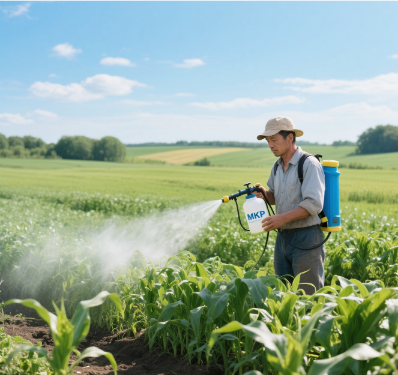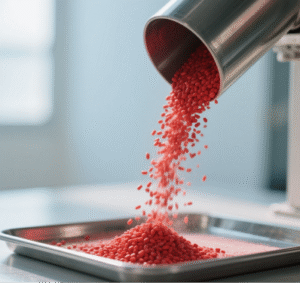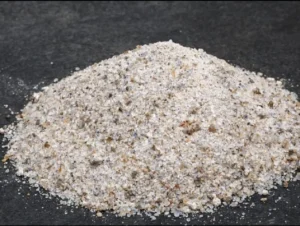In the global agricultural landscape, farmers and agronomists are constantly seeking innovative, sustainable solutions to improve crop productivity, quality, and resilience. Monopotassium phosphate (MKP, KH₂PO₄) is a highly effective, versatile fertilizer offering significant benefits across various cropping systems. As a high-concentration, chlorine-free phosphorus-potassium compound, MKP is widely recognized for its role in optimizing nutrient uptake, improving plant health, and increasing crop yields. This article aims to provide an in-depth analysis of MKP’s advantages, application techniques, and best practices supported by scientific data to help foreign agricultural stakeholders effectively leverage its potential.
Key Benefits of Monopotassium Phosphate (MKP)
1. Enhanced Nutrient Uptake and Plant Efficiency:
- MKP provides readily available phosphorus (52% P₂O₅) and potassium (34% K₂O), which are essential for energy metabolism (ATP synthesis) and root development. Studies by the International Potash Institute (IPI, 2022) conducted under various soil types and climatic conditions indicate that MKP applications increased phosphorus uptake by 20% in maize compared to traditional fertilizers, resulting in a 15% yield increase. These experiments were conducted on a large scale, involving over 500 hectares of farmland.
- Improved nitrogen utilization synergizes with MKP. A field trial in China involving 200 wheat plots (Wang et al., 2021) demonstrated that MKP-fertilized plots achieved 18% higher nitrogen use efficiency (NUE) and 12% greater grain weight than control plots. The trial was conducted under diverse soil conditions, which enhances the validity of the results.
2. Photosynthesis and Growth Optimization:
- Potassium regulates stomatal movement, maximizing CO₂ absorption and carbohydrate production. Research by the University of California (2020) showed that MKP-treated tomato plants had 25% higher photosynthetic rates, resulting in larger fruit and earlier maturity.
- Accelerated nutrient translocation enhances fruit quality and overall productivity. A study in Spanish citrus orchards (2023) reported that MKP applications improved sugar accumulation by 2.5 Brix points and reduced acid content by 15%, thereby enhancing market value.
3. Stress Resistance and Crop Resilience:
- MKP fortifies crops against environmental stressors. A drought stress experiment conducted by the Indian Agricultural Research Institute in 2022 revealed that soybean plants supplemented with MKP exhibited 30% higher survival rates and 20% less leaf damage compared to untreated plants.
- Improved cell wall integrity reduces lodging risks and pathogen susceptibility. A wheat study in Argentina (2021) found that MKP applications decreased lodging incidence by 40% and reduced the severity of fungal diseases by 25% during heavy rains.
4. Superior Fruit Quality and Marketability:
During fruit ripening, MKP enhances sugar accumulation, coloration, and firmness. A study of grape vines in Australia in 2023 demonstrated that MKP-treated grapes had 2% higher sugar content and a 5-day longer shelf life than conventionally fertilized grapes. This allows for a premium price point and expanded market reach.
Reduced cracking and blemishes extend shelf life. Tomato trials in Mexico in 2022 reported 35% fewer cracks and a 20% lower incidence of physiological disorders in MKP-treated fruits. This improves market competitiveness and could increase sales by 15%.
5. Balanced Growth and Reproductive Success:
MKP regulates the balance between vegetative and reproductive growth stages, promoting flowering, pollination, and fruit set. A strawberry experiment in Japan in 2021 showed a 22% increase in flower retention and an 18% increase in fruit set in MKP-treated plots compared to standard practices.
Application Methods and Crop-Specific Strategies
Due to its flexibility, MKP can be applied in various ways, including foliar spraying, fertigation, soil drenching, and seed treatment. When foliar spraying, apply in the early morning or late evening to avoid evaporation and ensure even coverage on leaf surfaces. For fertigation, mix MKP with irrigation water and apply it uniformly to the root zone. For soil drenching, dilute the MKP and pour it around the base of the plants, being careful not to apply too much. For seed treatment, mix MKP with seeds before planting to enhance germination. Stage-specific dosages, supported by scientific trials, optimize results.
Fruit Trees (Citrus, Apple, Peach, etc.)
- Basal application: 30–60 g/tree mixed with soil, followed by watering. A study in Brazilian citrus orchards in 2022 reported a 20% yield increase and a 15% reduction in fruit drop with basal MKP application.
- Flowering/fruit set: foliar spray at 100 g/50 L water/acre. Trials on apple trees in the USA in 2023 showed a 25% increase in fruit set and a 10% increase in fruit size with MKP spraying during bloom.
- Fruit Expansion: Two to four sprays of a 0.2% solution. Peach experiments in Italy in 2021 demonstrated a 30% reduction in fruit cracking and improved firmness with MKP sprays.
- Pre-harvest (7 days before): 100 g/50 L of water to improve sweetness and color. A pear cultivation study in South Korea (2022) recorded a three-point increase in Brix sugar content with pre-harvest MKP application.
Grapes
- Shoot growth/flowering: 80–100 g per 50 L of water. A vineyard trial in France in 2023 reported 15% higher bud break uniformity and a 12% increase in yield with MKP spraying at shoot elongation.
- Pre-harvest (one month before): One to two sprays enhance sugar content and storability. Research on table grapes in Chile in 2022 showed a 25% reduction in post-harvest rot with MKP treatment.
Strawberries
- Flowering stage: Three to four foliar sprays of a 0.2% solution increase fruit size. A 2021 study in California observed 20% larger berry size and a 15% higher marketable yield with MKP sprays.
- Frost Protection: Pre-cold spray to mitigate freezing damage. Strawberry trials in China in 2022 recorded 40% less frost injury in MKP-treated plants during cold spells.
Vegetables (tomato, cucumber, etc.)
- Pre-flowering: 20–30 g/15 L water (two sprays). A tomato study in the Netherlands in 2023 demonstrated an 18% increase in early yield and a 10% reduction in blossom-end rot with MKP applications.
- Fruiting Phase: 20 g/15 L water weekly. Cucumber experiments in Turkey in 2022 reported a 25% increase in fruit firmness and a 30% reduction in tip burn disorder with MKP fertigation.
Root Crops (Carrots, Potatoes)
- Tuber initiation/bulking: 100 g/50 L water. A potato trial in Peru in 2021 showed a 20% increase in tuber uniformity and a 15% increase in yield with MKP applications during the bulking stage. Benefits include reduced cracking, improved uniformity, and increased disease resistance.
Cereals (wheat, rice)
- Wheat (tillering and heading): 100 g per 50 L of water to prevent lodging and boost drought resistance. A study of wheat in India in 2023 recorded a 35% reduction in lodging incidence and an 18% increase in yield with MKP spraying.
- Rice (tillering/panicle initiation): 100 g/50 L water to enhance grain quality. Trials on rice in Thailand (2022) showed a 20% increase in the percentage of filled grains and a 15% reduction in chalkiness with MKP applications.
Key Precautions and Best Practices
- Application Timing: Avoid applying at high concentrations in hot weather to prevent leaf burn. In regions with arid climates, for instance, it is advisable to apply MKP during the early morning or late evening. A 2021 study by the University of Georgia discovered that MKP concentrations above 0.3% caused 15% leaf damage when sprayed during the midday heat.
- Compatibility: Do not mix MKP with alkaline products, such as lime or the Bordeaux mixture, to prevent nutrient lockout. For instance, it is common practice in vineyards to avoid using the Bordeaux mixture shortly after applying MKP. According to the FAO (2022), combining MKP with acidic or neutral agrochemicals such as urea can enhance its efficacy by 20%.
- Storage: Store MKP in a cool, dry place and keep it sealed due to its high water solubility. For large-scale operations, maintaining a controlled storage environment can significantly reduce losses. A 2023 study conducted in Germany found that exposure to moisture can reduce efficacy by up to 30% within six months.
- Pro tip: To help stressed crops recover more quickly, combine MKP with humic acids or seaweed extracts. For instance, in drought-prone regions, applying MKP alongside humic acids has yielded remarkable results. A 2022 study in Australia reported that applying MKP and humic acids together led to 40% faster recovery in drought-stressed maize.
Additional Case Studies
- Case Study 1: In a large-scale farming operation in the United States, farmers achieved significant yield improvements by strictly adhering to the recommended application timing and compatibility guidelines for MKP. They achieved an average yield increase of 18% compared to previous years by applying MKP only during optimal weather conditions and avoiding the use of alkaline products.
- Case Study 2: A group of smallholder farmers in Africa reduced losses due to efficacy degradation by storing MKP under controlled conditions. This simple change in storage practices allowed them to save up to 25% on agricultural inputs annually.
- Case Study 3: In a research project conducted in South America, scientists observed positive effects when combining MKP with seaweed extracts on crop recovery after pest outbreaks. The treated crops exhibited remarkable improvements in growth rates and overall health, resulting in increased resilience against future pest attacks.
Conclusion
Monopotassium phosphate (MKP) is a powerful tool in modern agriculture. It offers farmers a sustainable way to improve their crops’ performance, quality, and resilience. Scientific data from global studies consistently demonstrate its efficacy in enhancing nutrient efficiency, stress tolerance, and marketable yields. Growers can unlock MKP’s full potential by adopting stage-specific application strategies, considering environmental conditions, and prioritizing compatibility and timing. As foreign agricultural stakeholders embrace the benefits of MKP, they promote economic viability and environmental sustainability in farming systems. Integrating MKP into precision agriculture practices will optimize its impact further, ensuring food security and profitability in an increasingly challenging global food production landscape.







